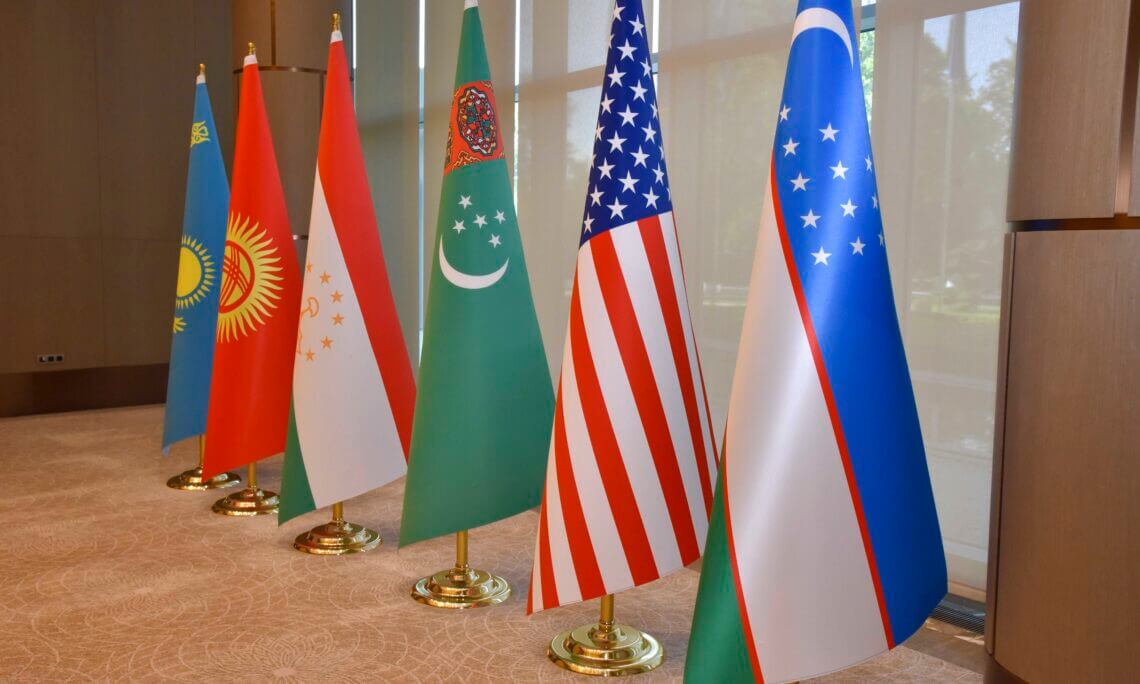The C5+1 countries (Kazakhstan, Kyrgyzstan, Tajikistan, Turkmenistan, Uzbekistan, and the United States) agreed to enhance cooperation to strengthen regional stability amid the worsening security situation in Afghanistan during a meeting held on the sidelines of the International Conference on “Central and South Asia: Regional Connectivity, Challenges and Opportunities” in Tashkent, Uzbekistan, on Friday.
The C5+1 affirmed their “commitment to enhancing engagement” through regional diplomatic channels and sought to “strengthen connectivity” between Central and South Asian regions via trade, transport, and energy links. “The C5+1 recognises that increased connectivity supports its shared goal of a prosperous and secure Central Asia,” a joint statement released after the meeting read. It added that such initiatives would “reinforce the C5+1’s commitment to strengthening the region’s security and stability, including through Afghan peace negotiations.”
Also Read: US, Afghan Presidents to Meet as Attacks in Afghanistan Surge
Moreover, the statement mentioned that the meeting focused on modernising infrastructure, increasing regional cooperation, improving energy sector connectivity, strengthening human rights and the rule of law, advancing cooperation with Afghanistan across security and economic lines, and addressing threats to “regional security, prosperity, and stability.”
The United States (US) Deputy National Security Adviser, Elizabeth Sherwood-Randall, who led the US delegation, stressed that Washington is committed “to realising the region’s potential as a transit, trade, and energy.” She also held separate bilateral meetings with officials from Uzbekistan, Tajikistan, Turkmenistan, and Kazakhstan “to identify concrete opportunities to enhance security in the region, address humanitarian concerns, and increase vaccinations to stem the spread of COVID-19.”
Additionally, Sherwood-Randall met Afghan President Ashraf Ghani and Foreign Minister Mohammad Haneef Atmar “to discuss the evolving security situation in Afghanistan, the US support for the Afghan National Defence and Security Forces, and diplomatic support for a negotiated political settlement to the conflict.” The US delegation also met the Indian Minister of External Affairs Subrahmanyam Jaishankar to discuss Afghanistan and counterterrorism cooperation.
Also Read: India EAM Jaishankar Presents Three-Point Road Map for Sustainable Peace in Afghanistan
The US seeks to increase cooperation with Afghanistan’s Central Asian neighbours to ensure stability in the war-torn country as its troops withdraw. In April, US President Joe Biden announced the complete drawdown of American forces in Afghanistan by September 11. However, earlier this month, Biden said that the troops would be completing their mission in Afghanistan by August 31.
Also Read: 90% of American Troops Have Been Withdrawn From Afghanistan, Says Pentagon
Against this backdrop, Central Asian countries, including Tajikistan, Turkmenistan, and Uzbekistan, have been affected by the Taliban’s offensives. Thousands of Afghan soldiers have sought refuge in these countries after the militant group launched attacks to capture districts along the borders. Tajikistan and Turkmenistan have reacted by reinforcing security measures and deploying thousands of troops to their borders. Earlier this month, US Secretary of State Antony Blinken hosted the Uzbek and Tajik Foreign Ministers in Washington to discuss bolstering security cooperation in light of the deteriorating security situation in Afghanistan.
Also Read: Uzbekistan Expels Afghan Troops Fleeing Taliban From Border
Last month, the United Nations envoy to Afghanistan, Deborah Lyons, stated that 50 of the country’s 370 districts had been captured by the Taliban since May. The Taliban has also claimed that they control around 85% of Afghanistan. Lyons warned that most of these districts surround provincial capitals, suggesting that the militants are “positioning themselves to try and take these capitals once foreign forces are fully withdrawn.” Such a situation could spell disaster for the fledgling Afghan democracy and completely derail the gains made over the years in human rights.
The International Conference on “Central and South Asia: Regional Connectivity. Challenges and Opportunities” aims to strengthen ties between Central and South Asian states and other global partners. The meet, which was held on July 15 and 16, was attended by around 250 participants and 40 delegates from different countries, including India, China, Russia, Pakistan, Iran, and Turkey.

